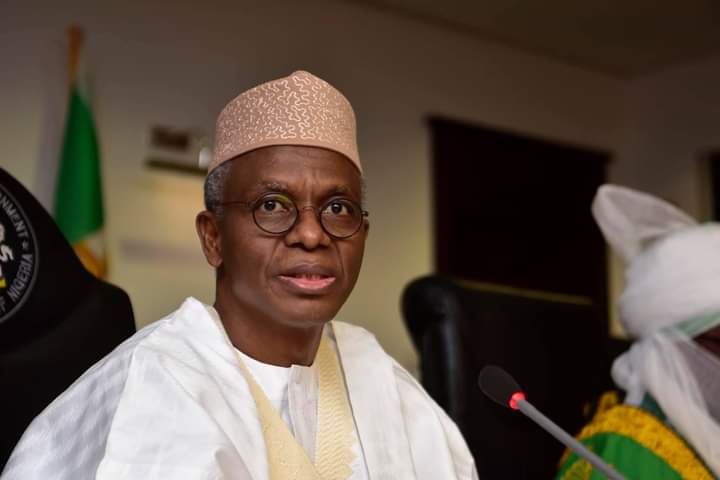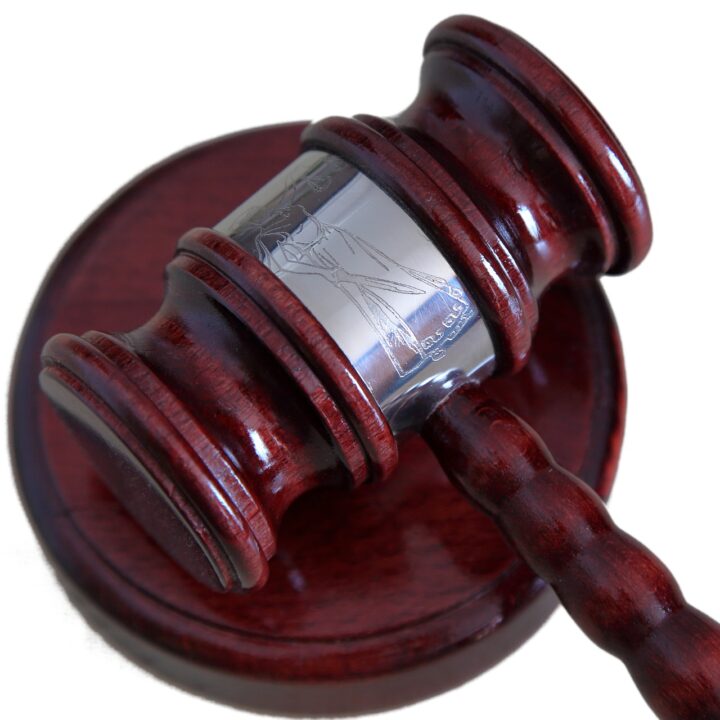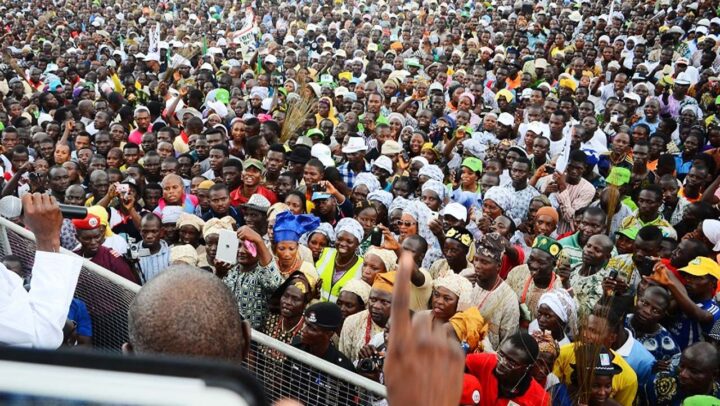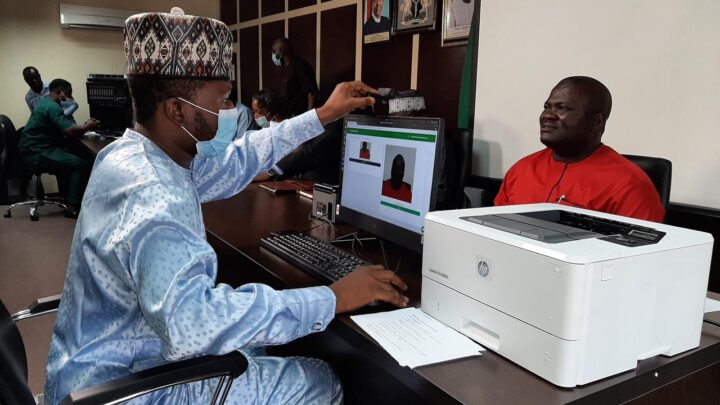Nasir el-Rufai
BY EMMANUEL ADO
“Statesmen tell you what is true even though it may be unpopular. Politicians will tell you what is popular, even though it may be untrue” — Anonymous.
In Nigeria, being an “executive governor” or “honourable minister”, guarantees the lucky occupant, and his immediate family a life of luxury, with several other benefits. Ordinarily, this ought to push them to deliver quality services to the people. But sadly, all Nigerians get in return from their “excellencies and honourable ministers”, are services, that are not in any way commensurate with the freebies they enjoy. The return on investment on public office holders is so poor, that where they project, Nigerian banks that hate risks, would have long stopped funding them.
The lack of performance by Nigerian public office holders has absolutely nothing to do with the bar being very low, rather it has to do with the lack of personal motivation to excel. So, most often than not, they are largely anonymous throughout their assignments. But after four years they certainly leave the office better-looking and into a life of luxury.
Advertisement
Nigerian public officers are specialists in delivering the “routine minimum”– payment of salaries and construction of roads that lead to nowhere.
But going by the ugly events in Kogi and Benue states, where governors Yahaya Bello and Samuel Ortom have shown these “routine minimums”, long taken for granted, have become an issue. No doubt, Nigeria is confronting a new crisis, an indication that the leadership crisis has indeed gotten worse.
But they can never be bothered because these “minimum routines” guarantee them “the governor or minister of the year award” from the Nigerian media forced by a very harsh economy to massage the fragile egos of these new masters if their business must survive.
Advertisement
Thankfully, Nasir el-Rufai, governor of Kaduna state, is an exception. He is unlike many of his colleagues, who have enjoyed the perks of the office, but not the work. El-Rufai, can’t in any way, be accused of failing to provide leadership, rather he has worked extremely over-hard to transform Kaduna state, for seven years. And the toll of the office and the sacrifices are clearly written all over him. Hadiza, his wife, in a tweet jokingly disowned him because of the physical wear and tear of governing Kaduna state on him. The consolation for El-Rufai is certainly the success of the various reforms, the myriad of projects, and the affection of the common people, concrete evidence that indeed he gave the job his all in the last seven years, which has led to the birth of a new Kaduna state.
Of the Peoples Democratic Party (PDP) administrations, only Ahmed Makarfi and Patrick Yakowa gave a good account of themselves.
El-Rufai inherited a dysfunctional Kaduna state due to years of “minimum routine” governance. Some previous administrations, military and civilian, are irresponsibly guilty of gross failure to provide the state with purposeful and decisive leadership. Ramalan Yero, who El-Rufai defeated in the 2014 elections, for instance, bluntly refused to address the rot in the educational sector, especially the incompetent primary school teachers, for fear of electoral defeat.
El-Rufai, on assuming office, had no option but to administer the very painful but difficult decisions so as to improve the quality of life of the Kaduna people. Central to El-Rufai’s politics are the people. From the onset, he knew these decisions weren’t going to be popular, but being a leader, he trudged on knowing history will positively judge him.
Advertisement
From the Bureau for Public Enterprises (BPE), where he convinced former President Olusegun Obasanjo, to introduce the contributory pension scheme, due to the funding crisis of the defined scheme, to the governor of Kaduna state, the consistent question has always been, how best to improve the well-being of the people?
El-Rufai’s campaign slogan, “putting the people first”, is a reflection of that genuine commitment, to improving the welfare of the people. This explains why in the last seven years there is no sector that El-Rufai’s transformative leadership hasn’t fundamentally impacted. It has been breathtaking. And there are no signs, El- Rufai, is about to slow down as he definitely wants to finish strong.
The general impression that Nigerians are desirous of consequential development and will wholeheartedly support any leader that meets their developmental aspirations is a fat white lie. The stiff resistance to El-Rufai’s well-intentioned reforms of the public service, the educational sector and the urban renewal projects, casts huge doubt on that assertion. Maybe, just maybe, while Nigerians truly desire development, it has to be without the pain.
Following the scandalous results from the teachers’ competency tests, administered by the Kaduna state government, some “well-meaning” Nigerians shockingly, but stridently canvassed for the retention of the incompetent teachers in the public service. To them, the question of how an incompetent teacher can deliver quality service to the public was unimportant. An appalling lack of standard.
Advertisement
Seven years after, El-Rufai, without any doubt, has every bragging right having delivered a strong economy, surgically reformed the public service and institutions, into a lean, but effective service, massive job creation, unprecedented infrastructural development, a record number of new businesses, strong leadership and a budgeting system, that is performing for the greater number of Kaduna citizens, as opposed to the ugly past, when the budget was consistently in favour of recurrent expenditure, making people question the existence of government.
For the 2023 governorship candidates desirous of making some difference, they have Nasir El-Rufai’s proven governance model to adopt. The only snag is that lacking in his political will, they might end up like their predecessors. However, in the event they can summon the courage, their very first lesson, is to refuse to be intimidated by fear of defeat from taking difficult decisions.
Advertisement
Internal democracy
Considering the demonization of El-Rufai as a dictator who brooks no dissent, it won’t be out of place to match the reality against the falsehoods. Seven years after, the falsehoods have since collapsed like a pack of cards. Members of the All Progressives Congress (APC) can’t still believe that El-Rufai is the party leader in the state because he has managed the party by consensus, rather than by directives. That’s the secret behind the united APC, Kaduna state chapter. His management of the state executive council isn’t any different. Superior arguments carry the day, not Governor Nasir El-Rufai’s position.
Advertisement
Also to the consternation of his traducers, El-Rufai didn’t just preach the virtues of democracy but practicalized them out several times over. The perfidy that is the norm in the other 35 states, is unknown to Kaduna state. To date, Kaduna state remains the only state where the opposition party has won elections and the ruling party lost. And because for El- Rufai voting is so fundamental to democracy, he invested huge resources to ensure credible elections by introducing the electronic voting machine (EMV); the first sub-national government in Africa to do so.
Infrastructural development
Advertisement
Without infrastructural facilities, there can’t be sustainable economic development, for the overall improvement of the living condition of the people. To make the state competitive, and preferred business destination, El-Rufai embarked on an aggressive urban renewal programme.
Before his bold efforts, for more than 100 years, the Kaduna metropolis had remained largely the same, despite having become home to more than five million people. The other two cities of Zaria and Kafanchan didn’t fare any better. The new network of roads has eased traffic congestion and opened new layouts. Excision of old layouts has forever been consigned to history.
Empowering women and youths
From his assumption of office, El-Rufai, clearly demonstrated by words and deeds a commitment that is so deep and passionate towards uplifting women and youths.
His first chief of staff was Hadiza Bala Usman. His deputy governor in his second term is a woman. In the state executive council, there are nine men and women. There are several other women holding key positions of responsibility in his administration, including the head of service, the driving force behind the reform and revitalization programme of the public service.
El-Rufai’s trust in the capacity of youths to deliver can’t be questioned. Under him, Kaduna state women and youths have never had it this good and this is because he understands that the duty of a leader is to produce more leaders.
Educational reform
What has set El-Rufai, apart from his colleagues is taking responsibility for the future. Since 2016, El-Rufai had committed to human capital development by investing in education, healthcare and social welfare; it’s thus not surprising that education and health sectors remain a priority and have deservedly been allocated 26% and 15% of the total proposed budget, far beyond the United Nations recommendations.
Peace and security
Security challenges, on which El-Rufai is most unfortunately judged, is an area in which he lacks any power to take action. State governors are glorified chief security officers, who have no control over any of the security agencies, beyond providing them with vehicles, fueling, maintenance, payment of their allowances and other logistics support.
Despite this, he has given a good account of himself. He created the first-ever ministry of internal security and home affairs, in reaction to the security challenges. Consistently published quarterly and annual security reports, which has gone a long way in dousing the narratives by certain forces, bent on demonizing him for political reasons. He has equally invested in technology to enhance security.
The other areas of impact are the public service, institutions and law. Since 2015, over 500 archaic laws have been painstakingly reviewed to meet the exigencies of the 21st century.
El-Rufai could have chosen the path of “minimum routine”, but that would not have been El-Rufai. Deceit is not in his El- Rufai’s dictionary. Precisely why he undertook many second term projects in his first term. His overwhelming victory in the 2019 election, despite elite gang up, was an impetus to do more in the second term. This quote by James Freeman Clarke: “A politician thinks of the next election – a statesman of the next generation”, best describes El-Rufai.
By masterminding the development of the new Kaduna state, El-Rufai has etched his name forever in the hearts of the people, beyond the boundaries of Kaduna state. In seven years, El-Rufai has shown that development is possible with total dedication and commitment. Though El-Rufai still has one year to go, like Julius Caesar, he can proudly proclaim: “I came, I saw, I conquered”.
Views expressed by contributors are strictly personal and not of TheCable.






